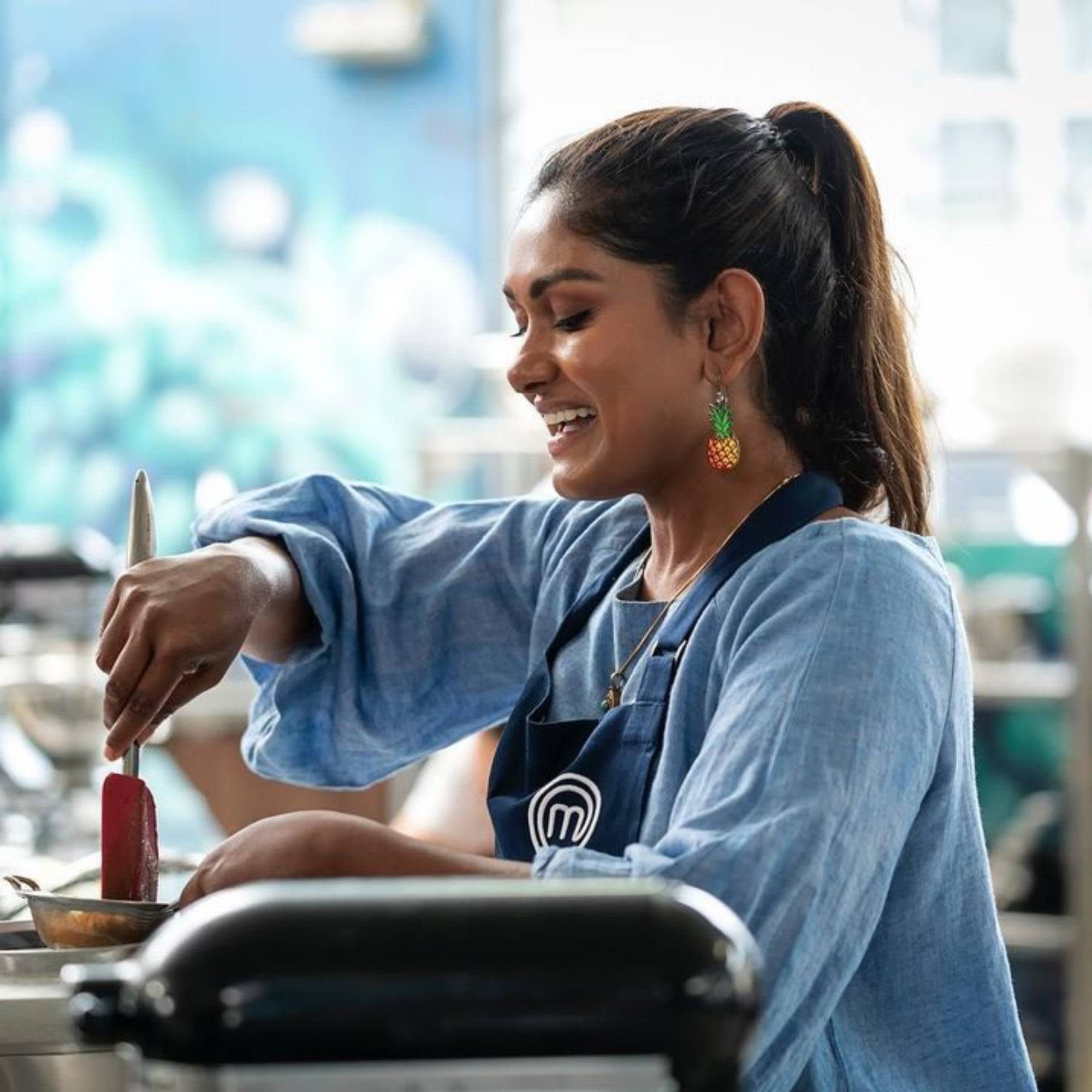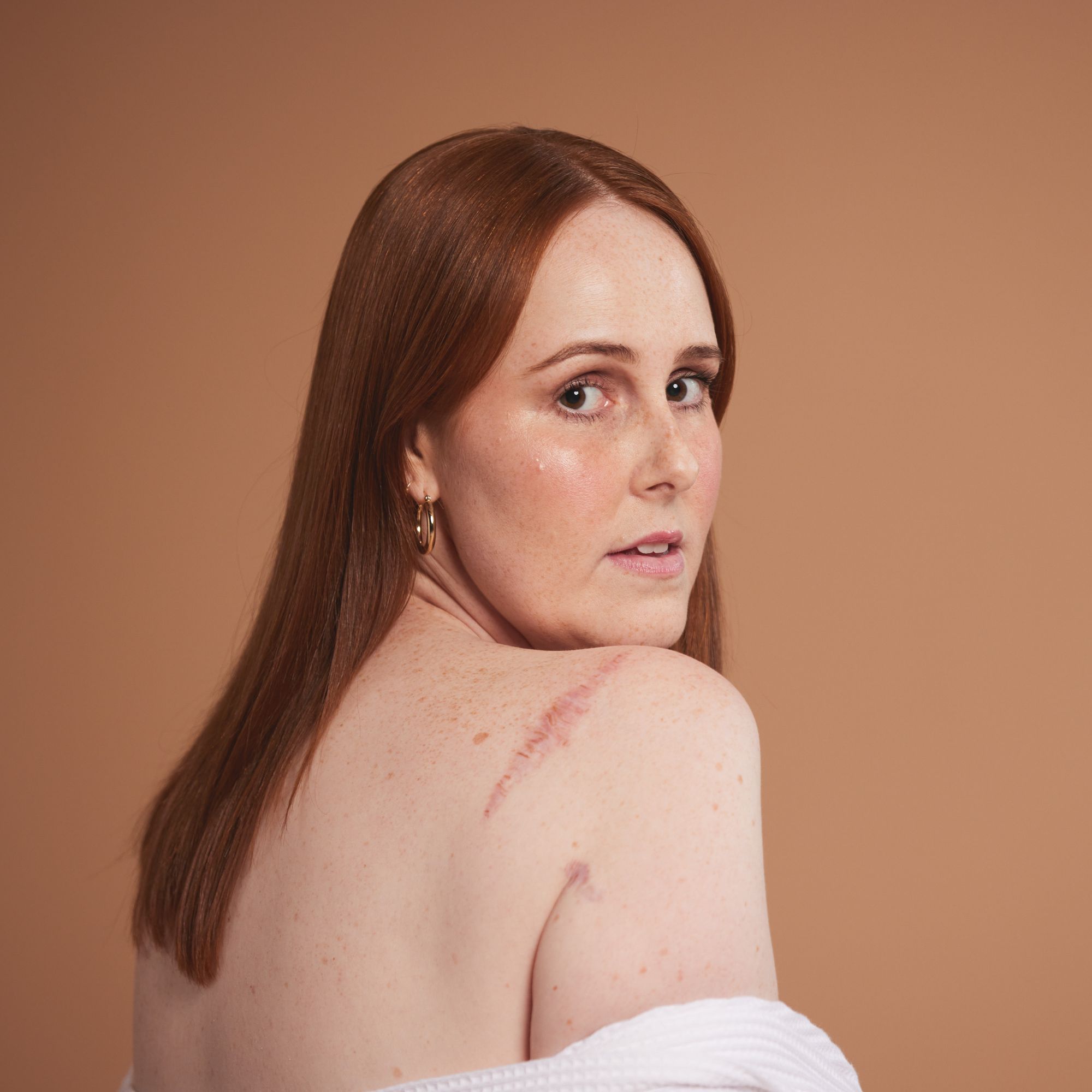
- POPSUGAR Australia
- Fitness
- “I Thought It Wouldn’t Happen to Me”: Why Courtney Mangan Stripped Off for Skin Cancer
“I Thought It Wouldn’t Happen to Me”: Why Courtney Mangan Stripped Off for Skin Cancer

“I think most people know someone who’s had some sort of skin cancer,” says Courtney Mangan, talking to POPSUGAR Australia from Queensland’s Gold Coast, “and the perception is you cut out any bad moles, and you get on with it. That was definitely my perception.”
Mangan was diagnosed with melanoma in 2017 at the age of 29. It wasn’t the unusual mole we’re told to keep an eye on, it was an innocuous lump on her upper back, caught during a skin checkup.
Despite having an uncle who died from melanoma, and a father with the disease, she describes herself as ‘naive’ to how serious the condition could be.
“I felt like it was serious, but I believed I was just going to get it cut out, and then go to my skin checks every three months for the rest of my life,” she says. “I just thought it wasn’t going to happen to me.”
When Mangan’s melanoma came back in 2019, this time it was aggressive. “It had spread, it was far more serious,” says Mangan. Suddenly the conversation changed from regular skin checks to surgery followed by cancer treatment, as did the trajectory Mangan had planned for her thirties.
What Melanoma in Your 30s Looks Like
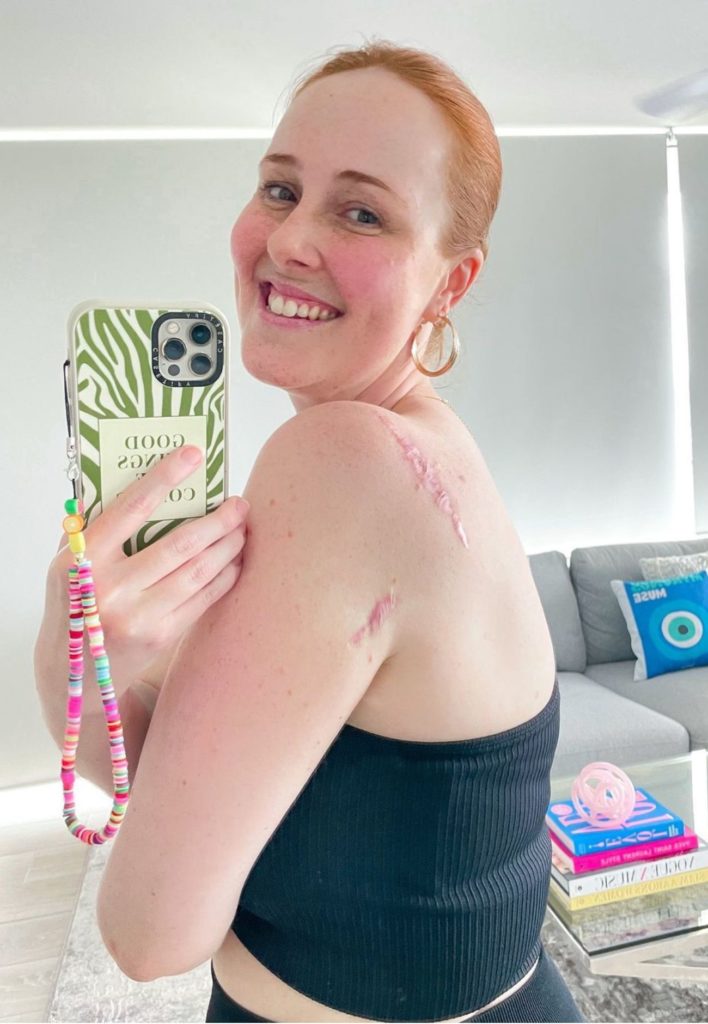
Mangan would be diagnosed twice again, both times in 2021, during a five-year period. Her milestones started looking very different to those of her friends. “I was 34 or 35, and a lot of my friends were pregnant and had to-go bags in case they needed to go to the hospital to deliver a baby. I had a go-bag because my body was failing me because of the cancer treatment. My friends were looking for houses to buy with their partners that had spare rooms for kids, whereas I was looking for apartments with spare rooms in case my mum had to come and take care of me.”
Although Mangan made the decision to freeze her eggs, she won’t be able to consider pregnancy until she’s completed a five-year ‘all clear.’ “Given I’ve only just made my one year all clear, I’ll be in my forties by the time I can even look at having children.”
Related: “Strip Off For Cancer”: Soon, You Can Thirst Trap on the ‘Gram for a Good Cause
Mangan’s experiences also took place during Covid, which meant that isolation requirements saw her going through treatment by herself, and living alone. Once the world ‘opened up’, that looked different for her too as someone with suppressed immunity.
She says very simply, the disease and the treatment has taken a lot from her.
During Mangan’s story, I find myself embarrassingly choking up. I feel rude and invasive prying into something so deeply personal. But, Mangan repeats her story in a calm, unemotional manner and a steady voice. It’s a voice accustomed to recounting a tale which she has been asked to repeat frequently and an ongoing story that she shares on her socials daily.
Living With Skin Cancer on Social Media
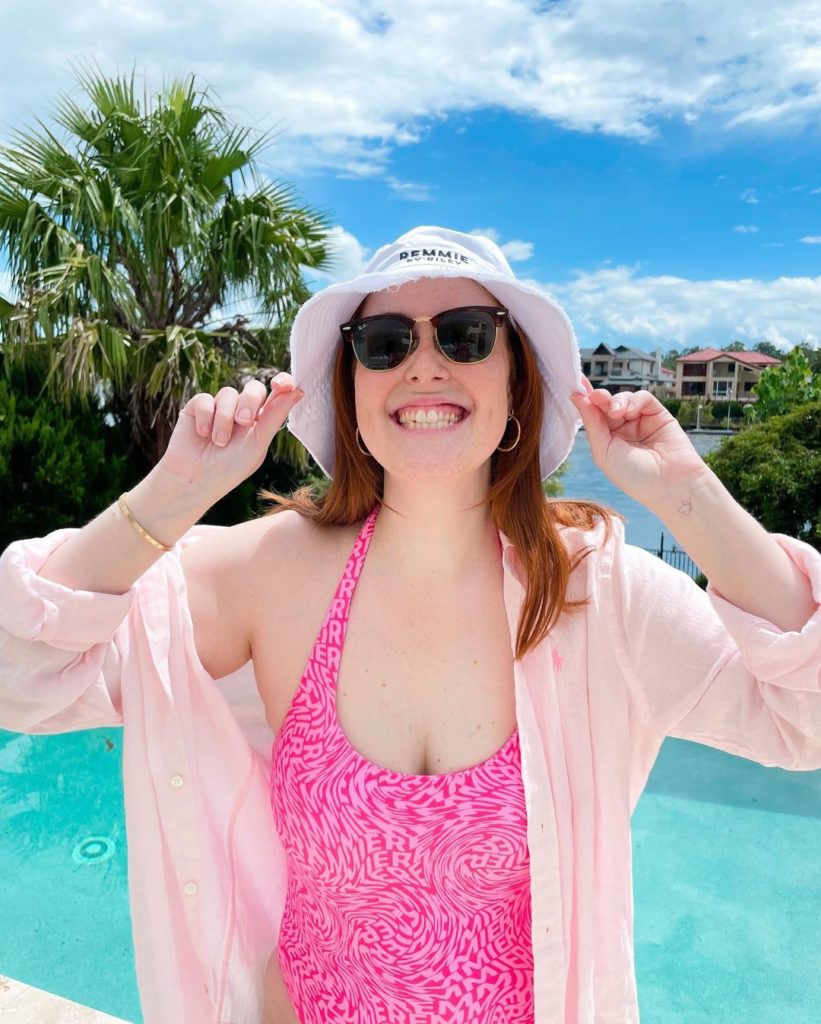
Social media has played a big role in Mangan’s cancer journey.
“I guess I was always a casual Instagram user, you know, posting what you’re eating for lunch,” she says, noting that changed with her second diagnosis in 2019. “I felt like I hadn’t been educated, in school or by healthcare professionals about how bad melanoma can be, I felt angry.”
So Mangan started sharing her story on social media. “Doctors couldn’t tell me what my treatment would look like, what it would involve,” she says. “The only thing I could control was sharing my story with the hope that other people might not find themselves in the situation I found myself in.” Whether it’s a PET scan or surgery, Mangan shares her experiences with her followers so they can see how serious melanoma can be.
Related: 7 Things Women of Colour Need to Know About Skin Cancer
That’s the trick with skin cancer. If detected early, survival rates are high, generally estimated at around 95 percent. This positive fact no doubt contributes to the perception that skin cancers are not that serious. But left unchecked they can be deadly and, as attested to by Mangan, the need for emergency treatment can derail the course of a life. In 2022, not enough Australians are getting regular check ups that can stop the disease from progressing.
While we receive reminders about cervical screenings, dentist appointments and mammograms, skin checkups aren’t as talked about. Odd, when Australia has the highest rate of melanoma in the world.
What We’re “Not Getting” When We Talk About Skin Cancer Prevention
For Mangan, one of the issues is we prioritise the wrong things when it comes to cancer prevention. For millennials and gen Z were raised with the ‘slip, slop, slap’ approach to cancer prevention, and while millennials in particular love posting about sunscreen, Mangan thinks they’re often missing the point.
“Women are getting a lot better [at using sunscreen] but that’s because a lot of sunscreen marketing is around anti-ageing.” For her, this doesn’t hit home. Mangan believes sun protection should be seen as much more than a step in your skincare routine. Very simply, “it should be about being alive, so you can have those wrinkles.”
Narratives around sunscreen also provide false reassurance about how protected we actually are in the sun. SPF, after all, only delays sun damage. It doesn’t stop it. And depending on where you sit on the Fitzpatrick scale, this delay could be ten minutes. This misunderstanding leads to people thinking all they need is a bottle of SPF to keep them safe during their summer sunbathing sessions.
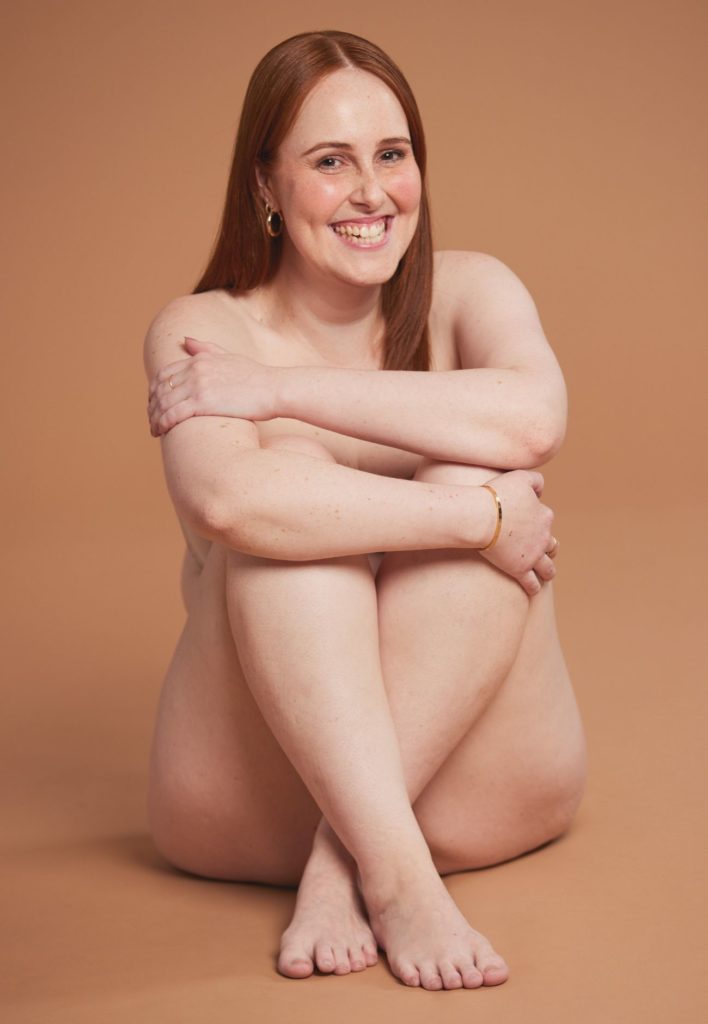
Related: I Got Naked and Talked Body Image, Self Acceptance and Toxic Tanning Culture With Jules Von Hep
The sun, surf, sand and SPF summer feed flood is a major point of frustration for Mangan. “It’s really amping up on my feed right now,” she says describing posts we’re all familiar with. “People sunbathing with a caption like, ‘Don’t forget to wear sunscreen!'”
Mangan desperately wants people to understand that sunscreen can only do so much, and there’s nothing safe or sexy about a tan.
“There is no safe way to sun-bake, a tan is a sign that your skin has received damage, and it’s not healthy, or sexy, or a cute way to make yourself look thinner.“
Mangan repeats the messaging given by the experts, that sunscreen is the last line of the defence and that particularly at the beach, in the middle of the day, an umbrella, a hat, and protective clothing are the only way to keep yourself safe. She would love to see people treat smoking or solariums.
“It’s not worth your life to have a few cute selfies on the beach,” and she adds, “fake tans are just as good these days.”
Working With Skin Check Champions
Ultimately, the best way to prevent serious melanoma is to get your skin checked regularly, which is why Mangan has partnered with Skin Check Champions on their campaign, Strip Off For Skin Cancer.
Strip Off For Skin Cancer is an activation that involves very literally, stripping off on the grid to raise awareness around the importance of regular skin checks.
Mangan says creating images that make people stop their scroll was essential, as so many campaigns around skin health are repetitive but it doesn’t seem to have an impact. “It’s a thumb stopper,” says Mangan. “Secondly its about reiterating you need to have the skin check, not just do the sun safety. It needs to be part of our yearly health maintenance.”
To find our more about Skin Check Champions and their Strip Off For Skin Cancer campaign, click here.


